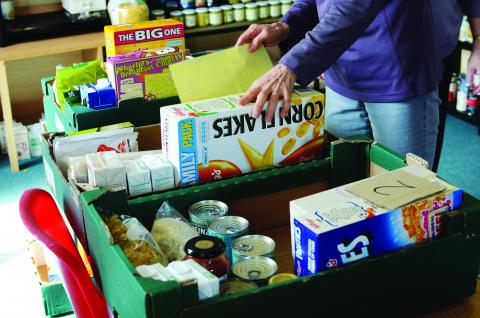16 January 2025
Food Prices Tracker: January 2025

By Josh Day
Food inflation remains at 2% (CPIH) according to government data
Latest data from the Office of National Statistics finds that overall inflation has fallen to 2.5% (CPI) in the 12 months to December 2024 despite economic concerns. However, food inflation has remained at 2.0% (CPIH). High food inflation had been a major contributor to rising overall inflation but has now decreased since the peak of the cost of living crisis. However, falling inflation does not mean that prices are coming down but that they are rising more slowly.
The Basic Basket
Despite food inflation slowing over previous months, food prices still remain high, and this continues to have a significant impact of people struggling across the UK. The Food Foundation’s Basic Basket is a shopping basket tracker to measure weekly price changes in what the average man and woman could typically eat as part of a reasonably costed, adequately nutritious diet (see FAQs for further details). We have been tracking the cost of the Basic Basket since April 2022. Since then, the woman’s basket of food has increased in price by 27.3%, now costing £52.13 per week. The male basket has increased by 28.6% (non-clubcard price) and currently costs £55.98 per week. This illustrates how though we may see lower rates of inflation, the reality for many is that the cost of food remains high.
Rising food prices in 2025
According to new modelling by the British Retail Consortium, food prices are forecast to increase by 4.2% on average in the latter half of 2025. This comes shortly after Labour’s autumn budget, in which increases to the national minimum wage and employer national insurance contributions were amongst the announcements. Retailers have been urging Labour to ease the tax burden that they say the budget has placed on them, warning that it will result in higher prices for consumers. However, retailers should do all they can to absorb these costs.
Any news of possible food price increases for consumers is concerning. Although this projected increase is far from the peak of the cost of living crisis, when food inflation peaked at around 19%, these kinds of price rises will be felt by millions of people who are already struggling across the UK. We know that increases in food prices are felt more severely by lower income households as the weekly shop makes up a significantly greater proportion of those households spending. Not only does evidence show us that those on lower incomes are affected most profoundly by food price increases, but those from minority ethnic groups and those living with a disability are also more likely to have experienced food insecurity.
It is important that any decisions to pass costs on to consumers are considered extremely carefully by businesses. With around 7.2 million adults (13.6%) experiencing food insecurity in the UK, according to The Food Foundation’s most recent food insecurity data, it is vital that we do not forget the very real impact these price increases could have on citizens. In the same survey commissioned by The Food Foundation 4.8% of households reported not eating for an entire day because they could not afford or get access to food. We also found that in 2024 over 1.2 million food sector workers where earning below the Real Living Wage, making them nearly 3 times more likely to earn below the Real Living Wage than workers across the whole economy.
While businesses are blaming the price rises on the recent national insurance changes, the reality is that there are wider national and international factors that are also likely to contribute to any future food price changes in the UK. Supply chain disruptions are likely to continue because of political tensions in the Middle East and the ongoing conflict between Russia and Ukraine, coupled with workers’ strikes across ports in the US and poor weather conditions, have made obtaining and transporting goods more expensive for companies. Furthermore, although the FAO food price index indicated that international food prices had been steadily falling year on year since they peaked in 2022, monthly figures from 2024 show that international food prices slowly increased throughout the year.
In previous years, we have seen these kinds of costs create a ripple effect that results in price increases through out the supply chain. However, despite the volatility of the last few years, the profits of the major UK supermarkets have, for the most part, remained stable. In fact, Tesco’s annual report showed retail adjusted operating profits (their preferred profit measure) of around £2.5 billion in 2023 and £2.8 billion last year. Moreover, according to Tesco’s annual report, the retailer paid out £859 million in dividends in 2023, and £777 million in 2024. Supermarket executive pay has also remained high: M&S CEO Stuart Machin’s pay increased by over £2 million year on year and Tesco boss Ken Murphy’s pay more than doubled from £4.4 million to £9.9 million in the year 2023/24. For both, CEO salary increases were a result of hikes in share payments and performance bonuses, rather than rises in basic pay, supporting the idea that overall supermarket profits remain healthy.
We have also seen the climate crisis recognised by government as an undeniable threat to global food security and have witnessed first-hand the impacts it can have on food prices and availability here in the UK. 2024 officially became the first year to pass the 1.5 C global warming limit, and in 2025, extreme weather is likely to continue. There has already been heavy flooding in the UK, Spain and Morocco and droughts in parts of Africa, Asia and the Americas. It is likely that we will continue to see this factor into increases of food prices for consumers.
With shocks to the food system likely to continue in 2025, it is vital that both national food security and food security at the household level remain a major consideration for businesses and policymakers alike. The development of a resilient food system — which can endure global disruptions and provide affordable, healthy, and sustainable food for everyone — must be a priority if we are to ensure the UK is not a place of haves and have nots, somewhere where people worry about providing their families with food, or millions of adults skip meals because they cannot afford or access the food they need. Our food system is certain to continue to face challenges year on year but people across the UK should not have to live in food poverty as a result.

Josh joined The Food Foundation in 2023 as part of the Rank Foundation’s Time to Shine scheme. He completed a BA in Film Studies before continuing to study an MA in Culture and Critical Theory. Before moving to The Food Foundation Josh worked in a variety of roles in a primary school setting, utilising his experience to support the most vulnerable and disadvantaged members of the school community. Josh is interested in the impact that food systems and environments have on people's lives and is driven by a desire to ensure people have better access to a healthy and nutritious diet.

Shona joined The Food Foundation as a Project Officer in 2019 and has worked on research, policy and advocacy across a range of projects over that time including leading our food insecurity surveys and flagship annual Broken Plate reports. She now works across the charity's policy portfolio including our children's food campaigns, food insecurity and food environments. She is a Registered Associate Nutritionist with a background in clinical nutrition who worked in dietetic departments in NHS hospitals before joining The Food Foundation.

Indu joined The Food Foundation in 2019 as part of the Rank Foundation’s Time to Shine scheme, moving into a Project Officer role in 2020. She works on the Peas Please and Plating up Progress projects. Prior to joining The Food Foundation, Indu completed a MSc in Public Health and a BSc in Human Nutrition. She is interested in reducing health inequalities, children’s health and wellbeing, and sustainable and nutritious food system/diets. Indu is also a lover of veg, having recently taken up urban gardening.





